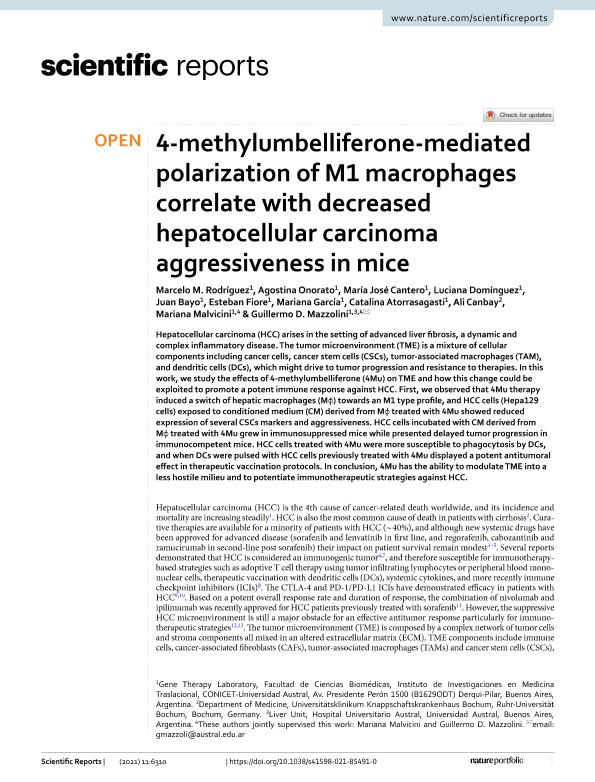Artículo
4-methylumbelliferone-mediated polarization of M1 macrophages correlate with decreased hepatocellular carcinoma aggressiveness in mice
Rodriguez, Marcelo Maximiliano ; Onorato, Agostina Mariana
; Onorato, Agostina Mariana ; Cantero, María José
; Cantero, María José ; Domínguez, Luciana María
; Domínguez, Luciana María ; Bayo Fina, Juan Miguel
; Bayo Fina, Juan Miguel ; Fiore, Esteban Juan
; Fiore, Esteban Juan ; García, Mariana Gabriela
; García, Mariana Gabriela ; Atorrasagasti, María Catalina
; Atorrasagasti, María Catalina ; Canbay, Ali; Malvicini, Mariana
; Canbay, Ali; Malvicini, Mariana ; Mazzolini Rizzo, Guillermo Daniel
; Mazzolini Rizzo, Guillermo Daniel
 ; Onorato, Agostina Mariana
; Onorato, Agostina Mariana ; Cantero, María José
; Cantero, María José ; Domínguez, Luciana María
; Domínguez, Luciana María ; Bayo Fina, Juan Miguel
; Bayo Fina, Juan Miguel ; Fiore, Esteban Juan
; Fiore, Esteban Juan ; García, Mariana Gabriela
; García, Mariana Gabriela ; Atorrasagasti, María Catalina
; Atorrasagasti, María Catalina ; Canbay, Ali; Malvicini, Mariana
; Canbay, Ali; Malvicini, Mariana ; Mazzolini Rizzo, Guillermo Daniel
; Mazzolini Rizzo, Guillermo Daniel
Fecha de publicación:
12/2021
Editorial:
Nature
Revista:
Scientific Reports
ISSN:
2045-2322
Idioma:
Inglés
Tipo de recurso:
Artículo publicado
Clasificación temática:
Resumen
Hepatocellular carcinoma (HCC) arises in the setting of advanced liver fibrosis, a dynamic and complex inflammatory disease. The tumor microenvironment (TME) is a mixture of cellular components including cancer cells, cancer stem cells (CSCs), tumor-associated macrophages (TAM), and dendritic cells (DCs), which might drive to tumor progression and resistance to therapies. In this work, we study the effects of 4-methylumbelliferone (4Mu) on TME and how this change could be exploited to promote a potent immune response against HCC. First, we observed that 4Mu therapy induced a switch of hepatic macrophages (Mϕ) towards an M1 type profile, and HCC cells (Hepa129 cells) exposed to conditioned medium (CM) derived from Mϕ treated with 4Mu showed reduced expression of several CSCs markers and aggressiveness. HCC cells incubated with CM derived from Mϕ treated with 4Mu grew in immunosuppressed mice while presented delayed tumor progression in immunocompetent mice. HCC cells treated with 4Mu were more susceptible to phagocytosis by DCs, and when DCs were pulsed with HCC cells previously treated with 4Mu displayed a potent antitumoral effect in therapeutic vaccination protocols. In conclusion, 4Mu has the ability to modulate TME into a less hostile milieu and to potentiate immunotherapeutic strategies against HCC.
Palabras clave:
hepatocellular carcinoma
,
4-MU
,
macrophages
,
mice
Archivos asociados
Licencia
Identificadores
Colecciones
Articulos(IIMT)
Articulos de INSTITUTO DE INVESTIGACIONES EN MEDICINA TRASLACIONAL
Articulos de INSTITUTO DE INVESTIGACIONES EN MEDICINA TRASLACIONAL
Citación
Rodriguez, Marcelo Maximiliano; Onorato, Agostina Mariana; Cantero, María José; Domínguez, Luciana María; Bayo Fina, Juan Miguel; et al.; 4-methylumbelliferone-mediated polarization of M1 macrophages correlate with decreased hepatocellular carcinoma aggressiveness in mice; Nature; Scientific Reports; 11; 1; 12-2021; 1-14
Compartir
Altmétricas



